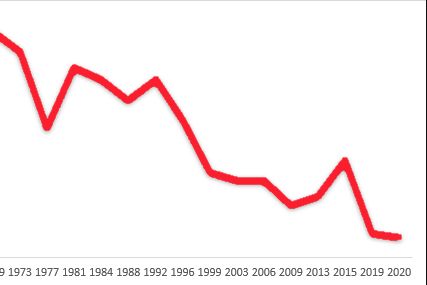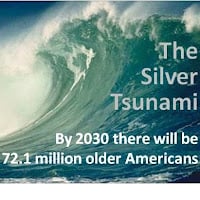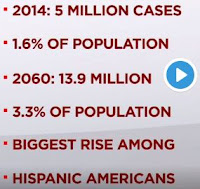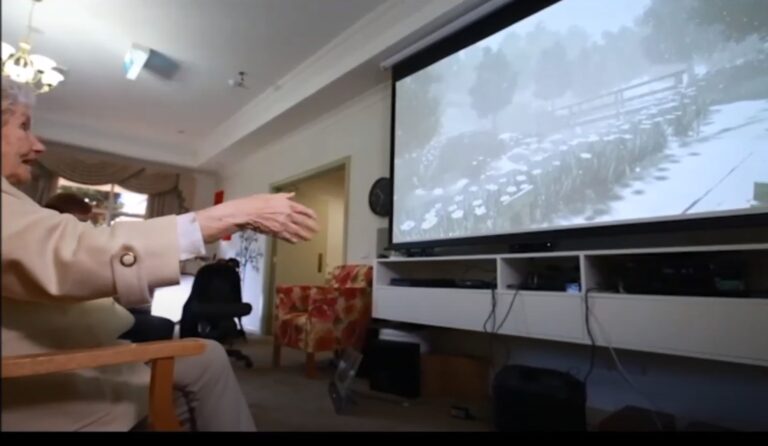Partial excerpt from AlzForum.com — As the baby boom generation reaches its hopefully golden years, scientists have been projecting a doubling of dementia cases in the U.S. by 2050, alarming health care agencies, the public, and health economists. Now, a new editorial argues this “tsunami” could be more of a gentle wave. In the March 12 JAMA, Eric Stallard, Svetlana Ukraintseva, and Murali Doraiswamy at Duke University, Durham, North Carolina, explain that tsunami predictions assume that dementia prevalence in each age range remains constant over time. That is not the case, they say.
- Over the last 40 years, age-adjusted dementia prevalence in the U.S. has dropped by two-thirds.
- This predicts a 25 percent rise in total dementia cases by 2050, due to population aging.
- The findings belie predictions of dementia doubling by 2050.
Their analysis of three large population studies found that age-adjusted prevalence has dropped by a whopping two-thirds over the last 40 years. In other words, every successive birth cohort has a lower risk of dementia than did its predecessor. Extrapolated forward, these rates would predict only a 25 percent bump in dementia cases by 2050. This would challenge conventional wisdom. “I feel a bit like Copernicus,” Stallard quipped.
Other scientists agreed this analysis is reasonable, and said it highlights the potential for people and societies to modify dementia risk through health and lifestyle interventions. “The authors convey a message of hope,” said Jennifer Weuve at Boston University School of Public Health. At the same time, commenters cautioned that encouraging trends toward better overall health may be erased by rising chronic health problems, such as obesity and diabetes. “Even though a dementia decline has begun, it might not last in the coming decades. The future depends on the balance of diverging trends,” Walter Rocca at the Mayo Clinic in Rochester, Minnesota, wrote to Alzforum (comments below).
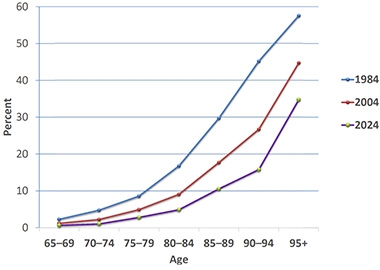
Rethinking Estimates
The doubling prediction comes from applying the current dementia prevalence at each age range to the 2050 population, when the U.S. Census Bureau predicts there will be twice as many people over age 80 as there are now (Hebert et al., 2001; Rajan et al., 2021). However, several population studies have found that incidence is falling in the U.S. and Europe, raising questions about future prevalence (May 2013 news; Jul 2014 conference news; Feb 2016 news).
Stallard became aware of these declining dementia rates while leading the National Long Term Care Survey from 1984 to 2004. This study, funded by the National Institute on Aging, used Medicare data to determine how many people over age 65 had disabilities requiring long-term care. Analyzing these data for the insurance industry, Stallard found that the prevalence of severe cognitive impairment fell by 2.7 percent per year during this period (Stallard and Yashin, 2016).
But Will the Trend Continue?
The big questions now are what brought dementia rates down, and whether this trajectory will be maintained, Stallard noted. There have been big improvements in public health since 1895, when the oldest birth cohort he analyzed was born. Nutrition and education have gotten better, infectious disease claims fewer lives thanks to vaccines and antibiotics, and doctors manage chronic health conditions such as cardiovascular disease and stroke more effectively. Deaths from heart disease plummeted about three-quarters during the same time period in which dementia fell by two-thirds, hinting the two could be linked. A recent analysis even suggests older people can continue to improve their literacy and math skills well into their 60s (Hanushek et al., 2025).
Scientists don’t know what may have had the biggest impact, but recent studies have emphasized the effects of modifiable factors such as exercise, smoking, hearing loss, and hypertension on dementia risk (Feb 2016 news; Jul 2022 news).
“This analysis provides evidence to support our forecast from 2011, and subsequent Lancet Commission reports, which estimated that up to half of the anticipated increase in dementia due to the aging of the population could potentially be prevented through risk reduction interventions,” Deborah Barnes at the University of California, San Francisco, wrote to Alzforum. The Lancet reports highlighted education and good management of chronic diseases in delaying cognitive decline (Barnes and Yaffe, 2011; Aug 2017 news; Aug 2020 news).
Go to the full article on AlzForum.com:
Is Dementia Incidence Still Dropping? Birth Cohort Data Say Yes.
